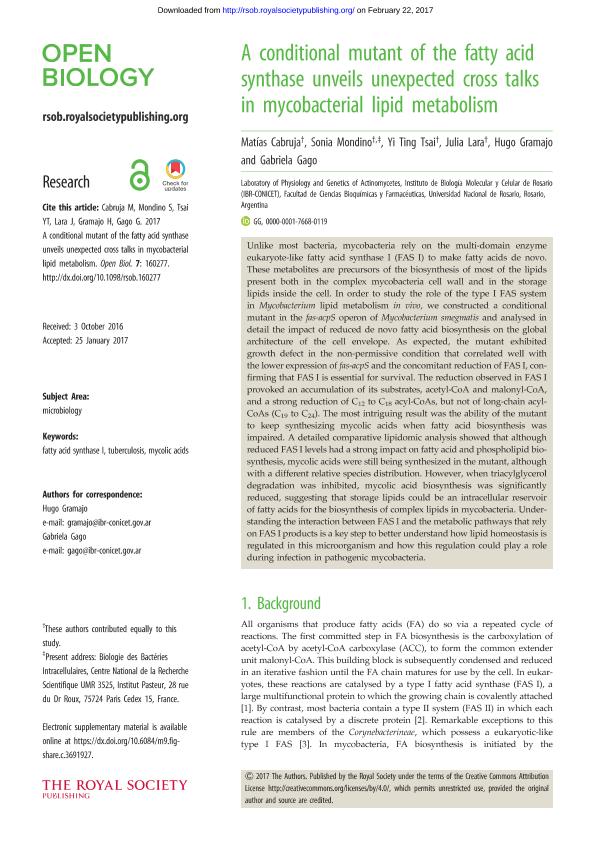Mostrar el registro sencillo del ítem
dc.contributor.author
Cabruja, Matias Ezequiel

dc.contributor.author
Mondino, Sonia Soledad

dc.contributor.author
Tsai, Yi Ting

dc.contributor.author
Lara, María Julia

dc.contributor.author
Gramajo, Hugo Cesar

dc.contributor.author
Gago, Gabriela Marisa

dc.date.available
2018-11-28T20:13:29Z
dc.date.issued
2017-02
dc.identifier.citation
Cabruja, Matias Ezequiel; Mondino, Sonia Soledad; Tsai, Yi Ting; Lara, María Julia; Gramajo, Hugo Cesar; et al.; A conditional mutant of the fatty acid synthase unveils unexpected cross talks in mycobacterial lipid metabolism; The Royal Society; Open Biology; 7; 2; 2-2017; 1-13; 160277
dc.identifier.issn
2046-2441
dc.identifier.uri
http://hdl.handle.net/11336/65530
dc.description.abstract
Unlike most bacteria, mycobacteria rely on the multi-domain enzyme eukaryote-like fatty acid synthase I (FAS I) to make fatty acids de novo. These metabolites are precursors of the biosynthesis of most of the lipids present both in the complex mycobacteria cell wall and in the storage lipids inside the cell. In order to study the role of the type I FAS system in Mycobacterium lipid metabolism in vivo, we constructed a conditional mutant in the fas-acpS operon of Mycobacterium smegmatis and analysed in detail the impact of reduced de novo fatty acid biosynthesis on the global architecture of the cell envelope. As expected, the mutant exhibited growth defect in the non-permissive condition that correlated well with the lower expression of fas-acpS and the concomitant reduction of FAS I, confirming that FAS I is essential for survival. The reduction observed in FAS I provoked an accumulation of its substrates, acetyl-CoA and malonyl-CoA, and a strong reduction of C12 to C18 acyl-CoAs, but not of long-chain acyl-CoAs (C19 to C24). The most intriguing result was the ability of the mutant to keep synthesizing mycolic acids when fatty acid biosynthesis was impaired. A detailed comparative lipidomic analysis showed that although reduced FAS I levels had a strong impact on fatty acid and phospholipid biosynthesis, mycolic acids were still being synthesized in the mutant, although with a different relative species distribution. However, when triacylglycerol degradation was inhibited, mycolic acid biosynthesis was significantly reduced, suggesting that storage lipids could be an intracellular reservoir of fatty acids for the biosynthesis of complex lipids in mycobacteria. Understanding the interaction between FAS I and the metabolic pathways that rely on FAS I products is a key step to better understand how lipid homeostasis is regulated in this microorganism and how this regulation could play a role during infection in pathogenic mycobacteria.
dc.format
application/pdf
dc.language.iso
eng
dc.publisher
The Royal Society

dc.rights
info:eu-repo/semantics/openAccess
dc.rights.uri
https://creativecommons.org/licenses/by-nc-sa/2.5/ar/
dc.subject
Fatty Acid Synthase I
dc.subject
Mycolic Acids
dc.subject
Tuberculosis
dc.subject.classification
Biología Celular, Microbiología

dc.subject.classification
Ciencias Biológicas

dc.subject.classification
CIENCIAS NATURALES Y EXACTAS

dc.subject.classification
Otras Ciencias Biológicas

dc.subject.classification
Ciencias Biológicas

dc.subject.classification
CIENCIAS NATURALES Y EXACTAS

dc.title
A conditional mutant of the fatty acid synthase unveils unexpected cross talks in mycobacterial lipid metabolism
dc.type
info:eu-repo/semantics/article
dc.type
info:ar-repo/semantics/artículo
dc.type
info:eu-repo/semantics/publishedVersion
dc.date.updated
2018-10-23T17:33:07Z
dc.journal.volume
7
dc.journal.number
2
dc.journal.pagination
1-13; 160277
dc.journal.pais
Reino Unido

dc.description.fil
Fil: Cabruja, Matias Ezequiel. Consejo Nacional de Investigaciones Científicas y Técnicas. Centro Científico Tecnológico Conicet - Rosario. Instituto de Biología Molecular y Celular de Rosario. Universidad Nacional de Rosario. Facultad de Ciencias Bioquímicas y Farmacéuticas. Instituto de Biología Molecular y Celular de Rosario; Argentina
dc.description.fil
Fil: Mondino, Sonia Soledad. Consejo Nacional de Investigaciones Científicas y Técnicas. Centro Científico Tecnológico Conicet - Rosario. Instituto de Biología Molecular y Celular de Rosario. Universidad Nacional de Rosario. Facultad de Ciencias Bioquímicas y Farmacéuticas. Instituto de Biología Molecular y Celular de Rosario; Argentina
dc.description.fil
Fil: Tsai, Yi Ting. Consejo Nacional de Investigaciones Científicas y Técnicas. Centro Científico Tecnológico Conicet - Rosario. Instituto de Biología Molecular y Celular de Rosario. Universidad Nacional de Rosario. Facultad de Ciencias Bioquímicas y Farmacéuticas. Instituto de Biología Molecular y Celular de Rosario; Argentina
dc.description.fil
Fil: Lara, María Julia. Consejo Nacional de Investigaciones Científicas y Técnicas. Centro Científico Tecnológico Conicet - Rosario. Instituto de Biología Molecular y Celular de Rosario. Universidad Nacional de Rosario. Facultad de Ciencias Bioquímicas y Farmacéuticas. Instituto de Biología Molecular y Celular de Rosario; Argentina
dc.description.fil
Fil: Gramajo, Hugo Cesar. Consejo Nacional de Investigaciones Científicas y Técnicas. Centro Científico Tecnológico Conicet - Rosario. Instituto de Biología Molecular y Celular de Rosario. Universidad Nacional de Rosario. Facultad de Ciencias Bioquímicas y Farmacéuticas. Instituto de Biología Molecular y Celular de Rosario; Argentina
dc.description.fil
Fil: Gago, Gabriela Marisa. Consejo Nacional de Investigaciones Científicas y Técnicas. Centro Científico Tecnológico Conicet - Rosario. Instituto de Biología Molecular y Celular de Rosario. Universidad Nacional de Rosario. Facultad de Ciencias Bioquímicas y Farmacéuticas. Instituto de Biología Molecular y Celular de Rosario; Argentina
dc.journal.title
Open Biology
dc.relation.alternativeid
info:eu-repo/semantics/altIdentifier/doi/http://dx.doi.org/10.1098/rsob.160277
dc.relation.alternativeid
info:eu-repo/semantics/altIdentifier/url/http://rsob.royalsocietypublishing.org/content/7/2/160277
Archivos asociados
